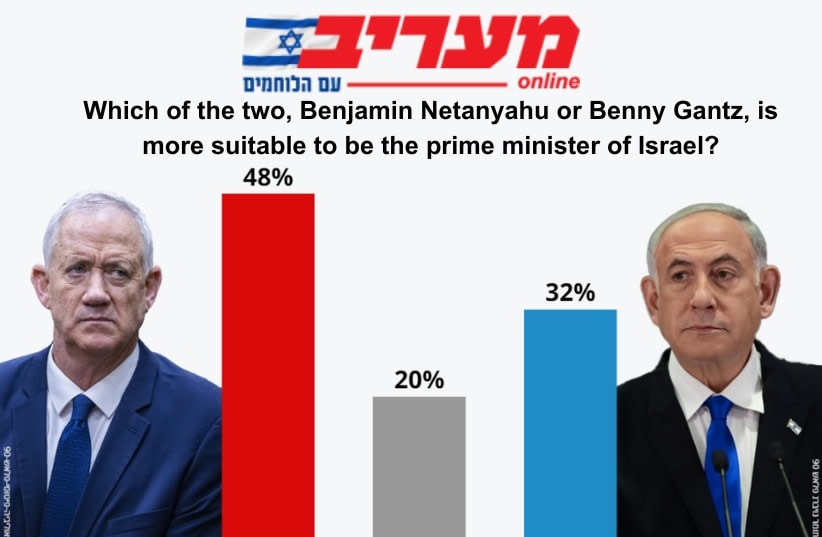Amid stale deliberations on the Gaza and northern fronts regarding a potential ceasefire, unresolved issues regarding captives, and the controversial provision of humanitarian aid that largely reaches the hands of Hamas, the National Unity Party faces another setback, losing an additional two mandates in this week's Maariv poll.
In contrast, Itamar Ben-Gvir's Otzma Yehudit Party continues to gain momentum, reaching its highest mandate count since the last elections.
These findings are from a recent survey conducted by Maariv in collaboration with Panel4All and led by Dr. Menachem Lazar from Lazar Research.
Benny Gantz's National Unity Party ahead of the rest
The National Unity Party, experiencing a decline of two mandates, now holds only 36, marking a total decrease of four mandates within the past two weeks. Likud also faces a decline, losing one seat and falling to 17 mandates.
In contrast, Otzma Yehudit has strengthened its position, the poll says, reaching its peak with 10 mandates.


The Religious Zionist Party and United Torah Judaism (UTJ) gained one seat each, while the remaining parties have maintained their status quo.
Overall, the coalition rose by two seats to 48, while the opposition experienced a slight decline to 62 mandates, compared to 64 the previous week.
Likud voters make switch to Gantz
According to the Maariv poll, the changes in the perception of suitability for prime minister are minimal. War cabinet member and head of the National Unity Party Benny Gantz received 48% support (compared to 49% in the previous survey), while Prime Minister Benjamin Netanyahu retains 32% support.
When analyzing the data further, it is revealed that approximately 25% of Likud voters in the 2022 Knesset elections believe that Gantz is suitable for the role.
In response to the question of who between Benjamin Netanyahu and Benny Gantz is more suitable to be the prime minister of Israel, the results are as follows: Gantz - 48%, Netanyahu - 32%, don't know - 20%.
Among supporters of the National Unity Party, 93% believe Gantz is suitable, with only 7% unsure. Among Likud supporters, 24% believe Gantz is suitable, 59% support Netanyahu, and 17% are undecided. Among Yesh Atid supporters, 91% favor Gantz, with 9% undecided.
The breakdown of responses shows a 6% decrease in Netanyahu's support among Likud voters this week, alongside a 4% increase in support for Gantz.
The survey, conducted on February 7-8, was comprised of 514 respondents representing Israel's adult population aged 18 and above, including both Jews and Arabs.
The maximum margin of error in the survey is 4.3%.
